In its inaugural year of operation, the Catherine and Don Kleinmuntz Center for Genomics in Business and Society significantly enhanced and accelerated the broader impact of the Carl R. Woese Institute for Genomic Biology’s (IGB’s) research and innovation by providing unique opportunities for public engagement and social impact. The Kleinmuntz’s generous support allowed IGB members to share their research and its implications with professional groups and the broader public, reaching roughly 3,500 people with educational events. The Center also launched the Mikashi Awards, a proof-of-concept program supporting IGB faculty innovations during their pre-commercialization phase. Supported projects demonstrate early market viability and have the potential to positively impact millions of people through improved cancer diagnostics and treatment. In addition, the Kleinmuntz Center website and social media presence have helped communicate with IGB members, supporters, and the public about these varied programs and events.
The IGB is extremely grateful to have partnered with the Kleinmuntz Center. The support, guidance, and leadership of Catherine and Don Kleinmuntz, whose support has made possible a number of impactful professional and community activities.
Mikashi Awards
The Kleinmuntz Center is funding two IGB faculty members with their innovations through their new pre-commercialization proof-of-concept program, the Mikashi Awards, named in honor of the Kleinmuntz’s children. This is the first time the IGB was able to offer such opportunities to researchers in order to facilitate the transformation of their discoveries and technologies into useful products and services that benefit society. The response to this competitive program was overwhelmingly positive, with numerous proposals received. An external committee reviewed and evaluated each project’s logistics and potential for commercialization.
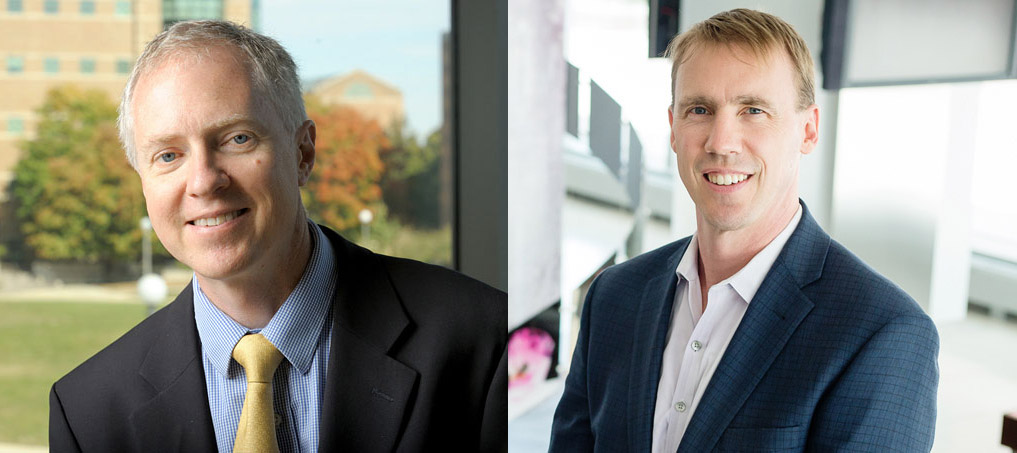
Two IGB members, Brian Cunningham and Paul Hergenrother, were each awarded $50,000 award in the first year. Professor Cunningham is the Donald Biggar Willett Professor of Engineering and leads the Omics Nanotechnology for Precision Cancer Medicine (ONC-PM) theme at the IGB. Professor Hergenrother is the Kenneth L. Rinehart Jr. Endowed Chair in Natural Products Chemistry, and leads the IGB's Anticancer Discovery from Pets to People (ACPP) theme. Both are also members of the IGB Mining Microbial Genomes (MMG) theme. Their proposals focus on aspects of cancer research, one by developing a new liquid biopsy technology called activate capture + digital counting (AC+DC) Assay Technology, and the other a novel therapeutic strategy for treating cancerous liver lesions, respectively.
Cunningham’s research has the potential to impact millions, as nearly 1 in 3 people will have cancer in their lifetimes, and almost 90% of all diagnoses are given to people over 50 years old. Early detection of brain, prostate, skin, breast, cervical, and colorectal cancer has been shown to improve outcomes, and given the high stakes, the clinical potential of liquid biopsy has attracted significant attention. Outside of the human impact, the liquid biopsy market is predicted to see significant financial growth. The Cunningham lab’s technology will have the ability to detect a general class of molecules that will be relevant for many different disease and wellness liquid biopsy applications.
Hergenrother’s project relates to a specific class of cancer treatments called transarterial chemoemoblization (TACE). The project itself aims to modernize and revolutionize this treatment, a common and minimally invasive therapy that targets cancerous tumors with immediate application to inoperable hepatocellular carcinoma (HCC) and several other cancers. The Hergenrother Lab’s strategy is to utilize a new anticancer compound recently identified at Illinois that rapidly and quantitatively induces death of cancer cells and to further evaluate the TACE protocol with this new drug in pet dogs with naturally-occurring, spontaneous cancers.
Hergenrother’s team expects to have generated significant preclinical and clinical data to advance this compound by the completion of the Mikashi Award grant period.
World of Genomics at the National Academy of Sciences
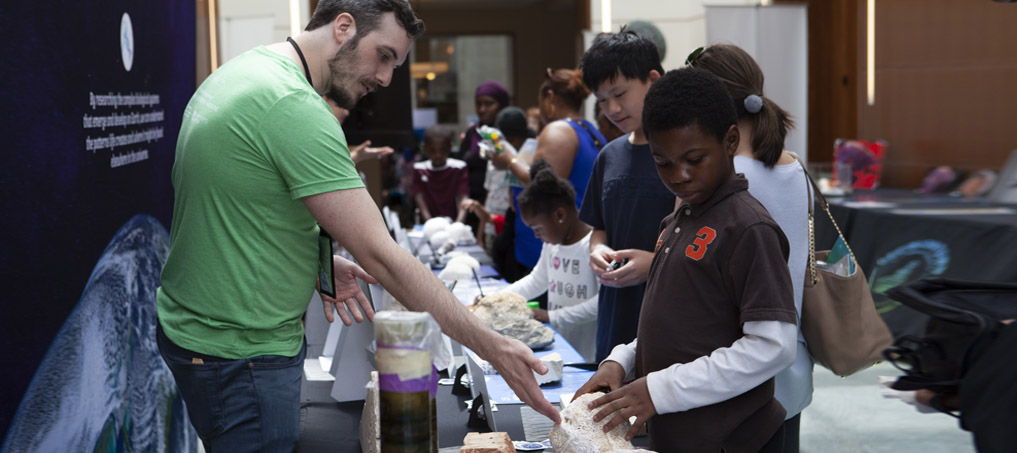
The Kleinmuntz Center funded one of the IGB’s most successful and comprehensive public engagement events, the World of Genomics, with the National Academy of Sciences - a private, nonprofit organization of the country’s leading researchers. The World of Genomics event was showcased on April 13, 2019, at the National Academy of Sciences building in Washington, D.C., requiring more than $500K worth of equipment to be transported from the IGB. This outreach program brought the full scope of IGB’s research in health, technology, the environment, and fundamental science to the public with hands-on activities and exhibits for all ages. Designed to make the broadest impact on the largest possible audience, IGB researchers were able to reach more than 3,000 participants during the one-day event, showcasing the IGB's extensive research portfolio to the general public, other researchers and policy professionals.
Art of Science on the Hill
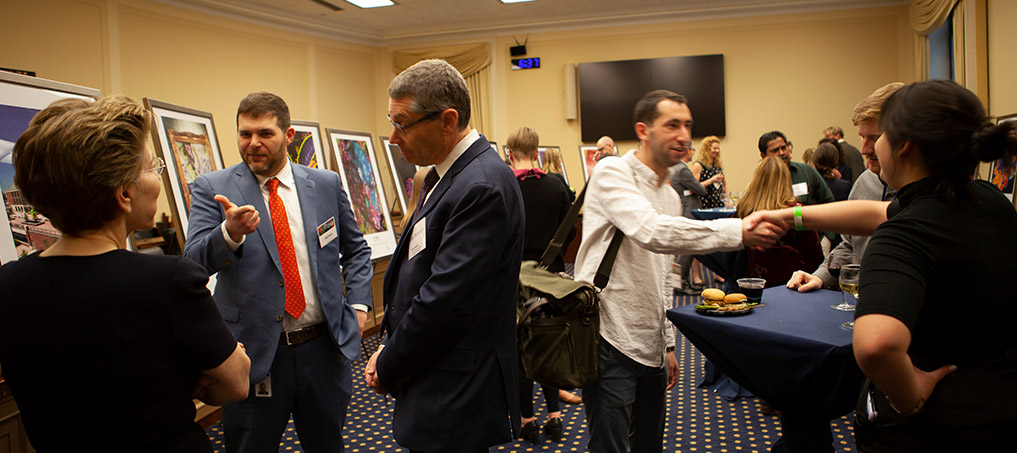
The Kleinmuntz Center sponsored the installation of an IGB Art of Science gallery, showcased on Capitol Hill at the Rayburn Office Building in Washington, D.C. The Art of Science program comprises enhanced images from IGB’s research portfolio, celebrating common ground between science and art, and serving as an entry point for the public to engage in genomics research taking place at the IGB. The Art of Science on the Hill installation featured twenty images captured by IGB researchers in the process of performing federally funded research projects. More than 100 guests visited the show, including Illinois alumni, members of Congress, lobbyists, and other government employees.
Professional Skills for Careers in Biosciences (PSCB) Series
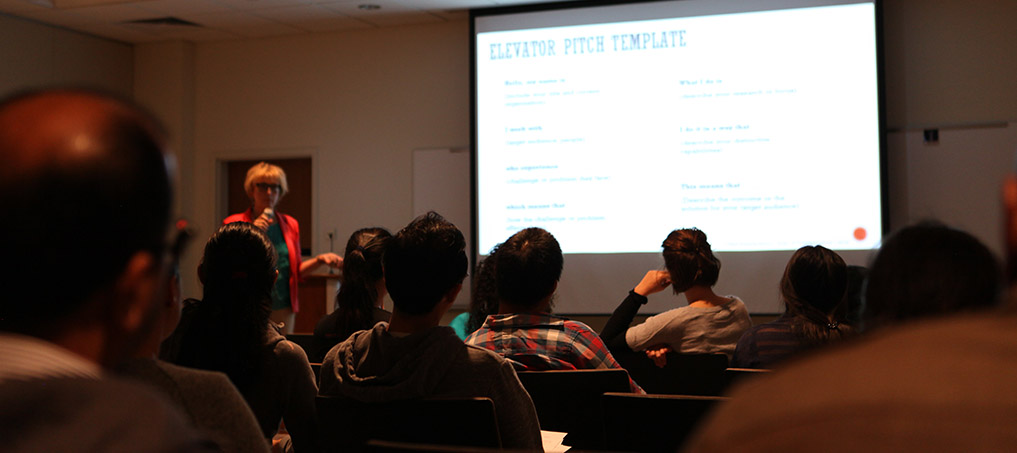
Kleinmuntz Center funding allowed the IGB to offer a brand new seminar series, called Professional Skills for Careers in Biosciences (PSCB). PSCB is a workshop-based certificate program that consists of thirteen sessions throughout the year and covers topics related to a variety of bioscience career paths, including academia, industry, entrepreneurship, policy, teaching, science writing, among others. Center funds enabled the program to invite a diverse group of workshop speakers to ensure students received the highest level of professional training. The program also concluded with a capstone project that involved participants forming companies and pitching to mock investors.
The PSCB seminar series was sought after so heavily by graduate students and post-doctoral students that a waitlist became necessary during course registration. In total, fifty graduate students and postdocs enhanced and expanded their universal job skills. At the conclusion of the program, 100% of participants reported that they benefited from taking part in the course and recommended the program continue as an offering in the future.
Genomics For™ Professionals
The Kleinmuntz Center also supported keynote speakers for the IGB’s Genomics For™ Judges and Genomics For™ Journalists workshops. These three-day professional workshops were the product of newly formed partnerships with the National Courts and Sciences Institute (NCSI) and the American Association for the Advancement of Science (AAAS), respectively, and allowed IGB scientists to engage with judges and journalists to share how genomic research has an ever-growing impact across fields, as well as support these professional groups in understanding and evaluating new findings.
More than 37 judges and medical professionals traveled from around the country to attend the Genomics for Judges event, one of six training programs organized for judges by the National Courts and Sciences Institute. The Kleinmuntz Center program received the highest quality and relevance scores of any of these events at research institutions.
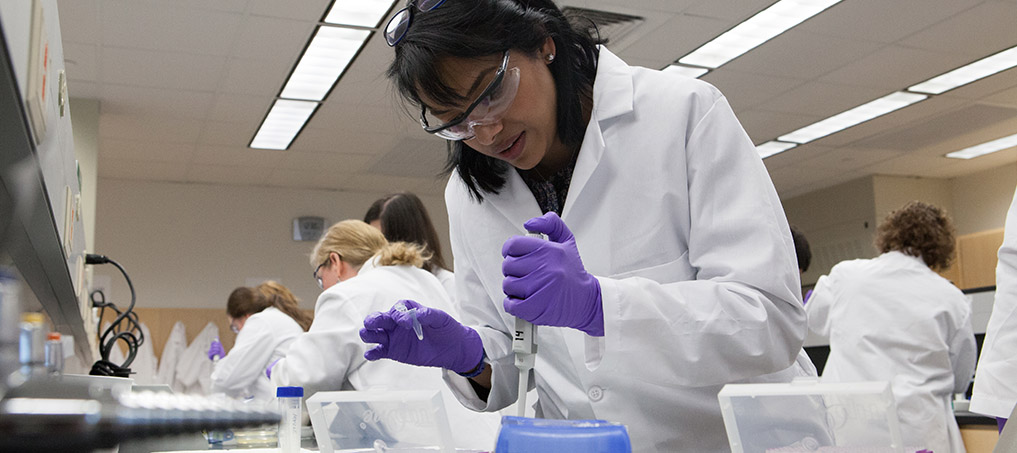
Similarly, 33 participants took part in the Genomics for Journalists course. Course participants traveled from around the country and represented more than 24 news organizations including NPR, NBC News, WTTW, and a variety of local news organizations that focus their reporting on topics including health, the environment, editorials, general science and more.
These professional development programs bridge the innovative research that is being performed at the IGB to other groups around the nation, highlighting the Center’s mission, as well as speaking to the quality of the research and speakers at the IGB and the applicability of their work to other fields.
Alan Alda Center for Communicating Science Seminar
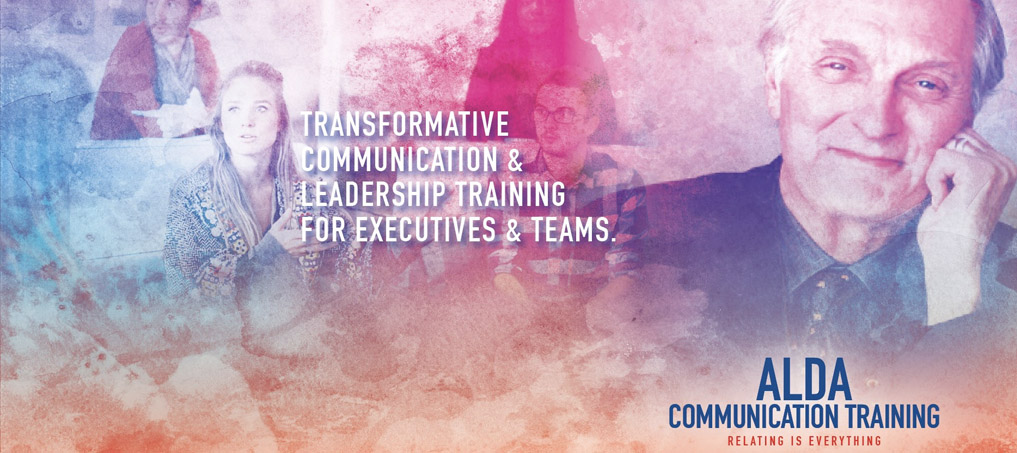
Kleinmuntz Center provided the opportunity for IGB researchers to attend a seminar presented by the Alan Alda Center for Communicating Science, in preparation for public-facing experiences such as our World of Genomics events, Genome Day, Pollen Power, and other IGB outreach programs. The Alan Alda Center program provided IGB scientists with an improved understanding of how to communicate scientific discoveries effectively to others outside of their disciplines and directly use these skills with the diverse audiences we encounter through our engagement efforts.
Loft Lucia Center Launch Party
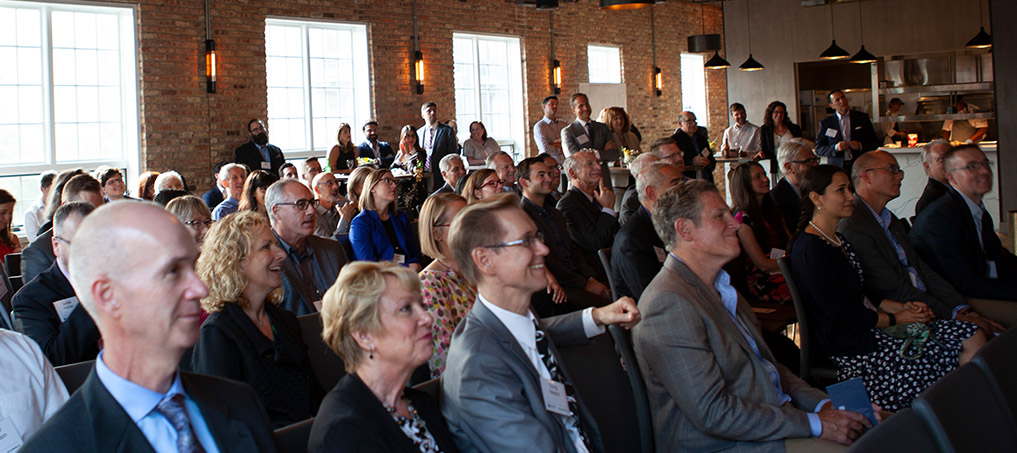
More than 100 guests convened to celebrate the Kleinmuntz Center on July 9, 2019 at Loft Lucia in Chicago. Guests made connections with a variety of academic and industry professionals and heard from several speakers including Kleinmuntz Center founders Catherine and Don, University of Illinois President Tim Killeen, Interim Vice Chancellor for Research Susan Martinis, IGB Director Gene Robinson, Donald Biggar Willett Professor of Engineering Brian Cunningham, Assistant Professor of Nutrition Zeynep Madak-Erdogan, and Kenneth L. Rinehart Jr. Endowed Chair in Natural Products Chemistry Paul Hergenrother. The reception and program served as a festive launch for the Kleinmuntz Center while serving its mission of building broader relationships to enhance the societal impact of discoveries made at the Carl R. Woese Institute for Genomic Biology.
The IGB faculty, staff, and administration thank Catherine and Don Kleinmuntz for helping us to advance the impact of genomics research on business and society, and look forward to the future accomplishments the partnership is sure to bring.
